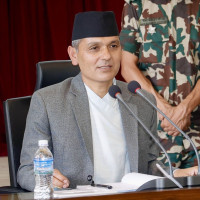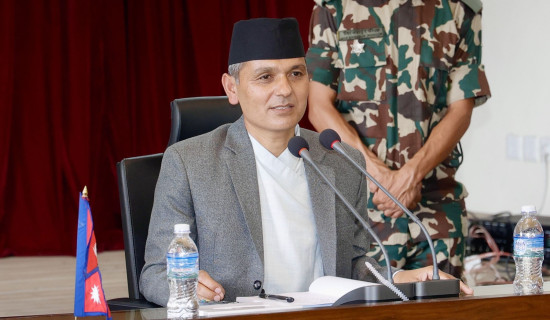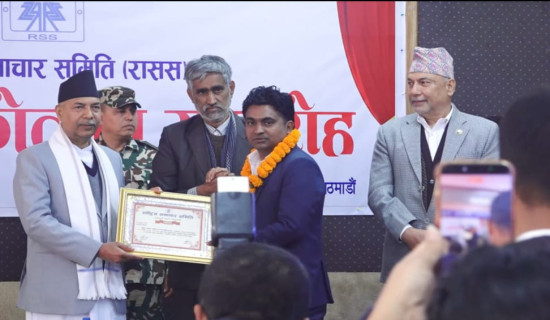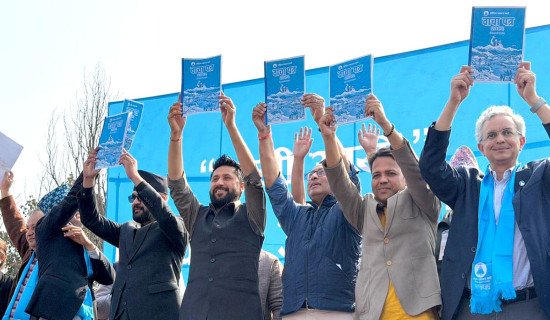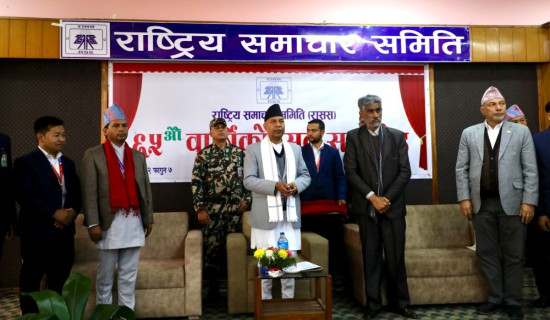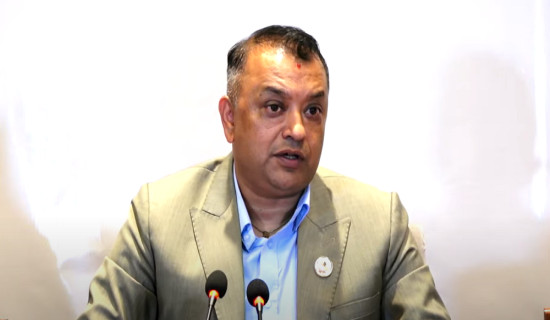- Friday, 20 February 2026
New Policy To Reinvigorate Tourism
The government has unveiled the Tourism Policy 2025 to give a new direction to the tourism sector. For a cash-strapped country like Nepal, tourism holds the potential to boost the economy. But unfortunately, the country has not been able to reap the benefits from this sector to the desired extent. The new policy is felt necessary because the Tourism Policy 2008, which has been superseded by the new policy, miserably failed to achieve the intended goals. A review of the policy has shown that out of the sixteen goals, only two goals were fully notched up. Partial or no implementation measures were taken to attain the other goals.
The new tourism policy has the key vision - a unique tourist destination: Nepal – within the policy framework. This shows that the policy is primarily aimed at exploring new destinations so as to promote the tourism sector differently. The policy intends to position Nepal as an attractive lifelong experience and as a safe, reliable and sustainable destination on the world stage. The tourism policy is part of the broad Visit Nepal Decade (2025-2035), with the current year (2025) being marked as a special tourism year. It may be noted that the government declared the 2020-2030 decade a tourism decade in 2020 itself but had to repeal it owing to the COVID-19 pandemic.
New tourist destinations
The tourism policy seeks to explore, identify and develop new tourist destinations to cater to the various tastes of tourists, to construct or upgrade infrastructure, to diversify tourism products and to ensure safety for tourists. Diversification of tourism products includes a wide array of experiences such as climbing, adventure and trekking. The policy seeks to enforce stricter safety standards for mountain climbers, trekkers and other adventure seekers. Preventing deaths of mountaineers owing to adverse factors is one of the safety protocols envisioned in the policy. The tourism policy seeks to attract digital nomads by formulating a separate visa policy for them. They can be made to stay in the country for extended periods. Digital nomads are those who work remotely through various digital tools or apps.
The tourism policy aims at boosting the tourism sector through public-private partnerships. The government and the private sector will collaborate synergistically by investing in the sector and by pooling their expertise and experiences for the promotion of the sector. Such collaboration is expected to contribute to the construction or upgrade of necessary infrastructure, such as road networks and accommodation facilities like hotels and resorts that meet international standards.
Tourists come to Nepal by either air or land. Besides expanding road networks, it is also imperative to expand air connectivity. The new airports – Pokhara Regional International Airport and Gautam Buddha International Airport – can be utilised to bring in international tourists. Direct flights, safer flight services and coordination between domestic and international airlines will help bring in tourists from various countries. However, an EU ban on the country’s flights over European skies has been a bottleneck in attracting as many tourists as possible from Europe. The government should take the initiative in getting the ban lifted.
The tourism policy accentuates ecological balance and sustainability. Over-tourism may bring about environmental degradation. The policy recommends the use of renewable energy, eco-friendly accommodations, efficient waste management and other sustainable practices. While promoting tourism, it is necessary to see to it that the environment is not affected through unsustainable practices. The environmental cost may surpass the revenue from tourism, which is a matter to ponder over.
This is the digital age. The tourism policy intends to utilise digital technology such as online portals, mobile apps and social media platforms to promote existing and emerging tourist destinations. Dissemination of information about Nepal as a tourist hub across the world is the key to attracting tourists in this information highway-dominated world. Establishing a niche in the global market is of paramount importance when it comes to promoting tourism. The policy aptly recognises the importance of technology in tourism marketing, management and communications.
The tourism policy also pays heed to developing tourism entrepreneurship. For this, the policy intends to impart training to aspiring entrepreneurs, especially youths. Besides training, financing and other support will also be provided for them. This provision is expected to produce new and energetic tourism entrepreneurs. This will create job opportunities on the one hand, while on the other, ultra-modern services can be provided for tourists.
Local communities
Last but not least, the tourism policy seeks to involve local communities in tourism activities. Local communities have indigenous knowledge of the surroundings. They have their own cultures, traditions and beliefs. These can be used as tourism products. And most tourists are also interested in such things. This will help create job opportunities for them, enabling them to uplift their economic status. In sum, the tourism policy has been formulated with an eye to overcoming the shortcomings of the now defunct tourism policy of 2008, which failed owing to, inter alia, inadequate resources, weak coordination between government entities and between the government and the international community and a lack of a clear governance framework.
The new policy has formulated a clear framework for proceeding with tourism activities in a new but sustainable manner. Till now, Nepal has attracted fewer than 1.2 million tourists a year. Considering that the country is blessed with natural, social and cultural features conducive to attracting a large number of tourists from different parts of the world, this number is too small. By making improvements in the tourism sector by adopting the measures as envisaged in the tourism policy, the country can drastically increase the number of tourists. This will increase the contributions of the tourism sector to the gross domestic product, boosting the national economy. For this to happen, the provisions outlined in the tourism policy should be implemented in earnest.
(Maharjan has been regularly writing on contemporary issues for this daily since 2000.)







